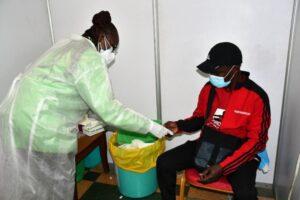- Africa’s death rates from COVID-19 infections are significantly higher in patients with diabetes
- The disease causes inflammation and poor blood circulation, both of which increase the risk of complications, including death, from COVID-19
- In addition to people with diabetes, the three most frequent underlying conditions included patients with HIV and hypertension
New data indicates that Africa’s sharp increase in diabetes is clashing with the COVID-19 pandemic and poor access to vaccines.
Africa’s death rates from COVID-19 infections are significantly higher in patients with diabetes, according to a preliminary analysis which the World Health Organization (WHO) presented today in advance of the World Diabetes Day on 14 November.
Dr Matshidiso Moeti, WHO Regional Director for Africa said the COVID-19 pandemic will eventually subside, but Africa is projected in the coming years to experience the highest increase in diabetes globally.
“We must act now to prevent new cases, vaccinate people who have this condition and, equally importantly, identify and support the millions of Africans unaware they are suffering from this silent killer.”
According to WHO, diabetes impairs the body’s ability to produce or process insulin, a substance essential to counteracting a dangerous rise in blood sugar.
The disease causes inflammation and poor blood circulation, both of which increase the risk of complications, including death, from COVID-19.
A recent WHO analysis evaluated data from 13 countries on underlying conditions or comorbidities in Africans who tested positive for COVID-19.
It revealed a 10.2% case fatality rate in patients with diabetes, compared with 2.5% for COVID-19 patients overall.
The case fatality rate for people with diabetes was also twice as high as the fatality rate among patients suffering from any comorbidity. In addition to people with diabetes, the three most frequent underlying conditions included patients with HIV and hypertension.
The countries contributing data to the analysis were Burkina Faso, Chad, Cote d’Ivoire, Democratic Republic of the Congo, Eswatini, Guinea, Namibia, Niger, Rwanda, Senegal, Seychelles, Sao Tome and Principe and Uganda.
An estimated 24 million people are living with diabetes in Africa in 2021 according to the International Diabetes Federation and the continent is expected to experience the highest increase in diabetes globally, with the number of Africans suffering from the disease predicted to rise to 55 million by 2045, an increase of 134% compared with 2021.
Low, Middle-income countries to benefit from US$150m guarantee for vaccines
The organization adds that Africa is the region with the highest number of people who do not know their diagnosis – an estimated 70% of people with diabetes do not know they have the disease.
“Health officials in Africa should take advantage of the growing availability of low-cost rapid diagnostic tests to routinely test patients in diabetes centres to ensure early detection and proper care,” said Dr Benido Impouma, Director, Communicable and Noncommunicable Diseases Cluster at WHO Regional Office for Africa.
“These centres also can be key venues for vaccination.”
Since the early days of the pandemic, people with diabetes in countries around the world have been prioritized to receive COVID-19 vaccinations. Africa has faced challenges in this strategy.
Access to vaccines remains poor. Thus far, only 6.6% of the African population is fully vaccinated against COVID-19, compared with about 40% globally.
Data from 37 countries indicates that since March 2021, over 6.5 million COVID-19 vaccine doses have gone to Africans with comorbidities, representing 14% of all doses administered so far. Efforts to prioritize people with comorbidities, like diabetes, are accelerating with about half of those 6.5 million doses administered in just the last couple of months. However, there is still a lot more work to be done to ensure people at high risk receive the vaccines they need.

“Nine months since COVID-19 vaccination campaigns began in Africa, we are still nowhere near where we need to be with protecting our most vulnerable,” Dr Moeti said. “There is an urgent need to step up vaccination and other key services to people at high risk, including those with diabetes.”
There are two main types of diabetes: type 1 caused by a condition early in life that damages the pancreas and impairs insulin production; and type 2—which is linked to poor diet, obesity and lack of exercise—where the body struggles to process insulin.
About 90% of diabetes cases globally, and the vast majority in Africa, are type 2, with rising rates in Africa attributed to the same poor diets and sedentary lifestyles causing a surge in type 2 diabetes around the world. In addition to COVID-19 risks, diabetes can also increase risk of heart attack, stroke, kidney failure, lower limb amputation, visual impairment, blindness and nerve damage, including erectile dysfunction.
“All Africans at risk of diabetes must have access to testing,” Dr Moeti said. “We can also stop diabetes from claiming more lives by promoting healthy, affordable diets and regular exercise.”
During the COVID-19 pandemic, access to diabetes care has been severely disrupted in the African Region. Lockdowns to limit the spread of COVID-19, for example, have impeded access to health care and the basic elements of proper disease management, such as routine glucose monitoring and eating a healthy diet.
To improve equitable access to quality diabetes care, WHO launched the Global Diabetes Compact in April 2021. This builds on work in recent years to rollout the WHO Package of Essential Noncommunicable Disease (WHO PEN) interventions for primary health care in low-resource settings.
So far 21 African countries have started using this package. Benin, Eritrea, Eswatini, Lesotho and Togo have achieved national expansion covering all primary health care facilities. (glasshousefarms.org)
G20 countries have 15 times more COVID-19 vaccines per capita than Sub-Saharan Africa: report